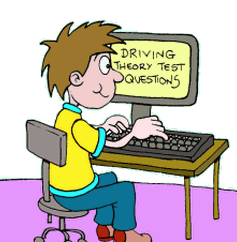What time of day should I book my driving test?
This is entirely up to you and so there is no right or wrong answer to this.
Many of us function either better in the morning or in the afternoon. If
you are a morning person then you will want to take the test in the morning
when you are at your best.
If however you are an insomniac or find it hard to get to sleep when you
have something big coming up the following day, then it would make sense to
book the test for the afternoon so you are not anxious about having to get
up early in the morning. However, if you are someone whose nerves will
build steadily during the day, then it might be best to do it in the morning
to get it over with, as it were, one way or the other!
Of course, most people will want to take the test in the daylight. Another
consideration for some can be road traffic conditions. Now, whilst most
roads are busy most of the time these days they do of course vary
considerably, and so you might like to avoid certain times of day when you
know all the roads near the test centre are really busy, as many find it
easier and less pressured to take a test on quieter roads when there is less
traffic about (and in turn less potential and developing hazards around).
Try not to put too much pressure on yourself - the good thing about the
driving test is that, if you do fail, it is easy to arrange another one:
although you have the cost of the test which is not to be sneezed at, it is
much easier to retake than school exams for instance.
Related Articles...
Maintaining your car
It is essential that you look after your car and keep it in good condition. Not only is this paramount for your safety and that of other road users, but also it means that the longevity of your car...
Tips on preventing car crime
It is an obvious statement that nobody wants their car to be broken into or have items stolen from their car. Yet despite this some drivers take little care in discouraging theft.
There are...
The automatic car explained
In most cases, you will learn to drive with a car that has gears in the United Kingdom.
However there are people who prefer to learn in an automatic car, and there are various driving schools...
Driving Theory Stopping Distances
Stopping distances refer to the distance that you car is going to travel from the time that you decide that you need to press the brake through the time that the vehicle physically stops...
Overtaking cyclists safely
You need to constantly be on the lookout for cyclists because they are a lot less visible than cars and motor vehicles.
Whilst cyclists should have lights in poor light conditions or in the...
Driving Theory Test
Until relatively recently in driving history, there was no theory test. From the time the first person passed a driving test in the UK in 1935 through to 1996, there was no separate theory test. ...
What to do at a ford
This article is about driving through a ford, not about driving a Ford car.
When you see a warning sign for a ford you should naturally slow down. Then look at the ford and assess the depth...
What to do with keep clear markings
Keep clear markings are quite straightforward to understand, although amazingly some people either ignore them or do not appear to understand what they mean!
You will often seen keep clear...
Tips on driving in half light
Most drivers prefer driving in the day in good light in optimum road conditions, because these are the best conditions in which to see exactly what is going on in the road.
However there are...
Your ignition warning light
When you turn on the electrical circuits in your car, then the ignition warning light will come on: make sure that this does indeed happen.
Once the engine itself is started, then the ignition...
Back to home page of driving theory test questions

